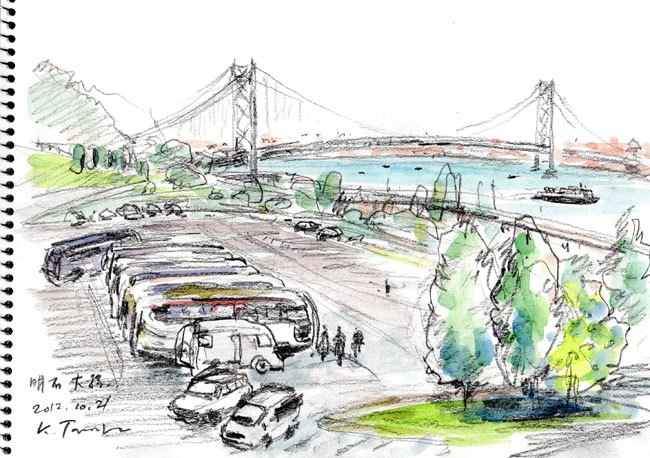Errand of Mercy: A Late Night Journey Across Japan
Typical Japanese Highway scene
Total silence is not the kind of thing you expect in Japan. Given the fact that there are almost 130 million people crammed into a country roughly the size of the State of California, only 20% of which is actually habitable, the din of human activity follows you wherever you go. It is an incredibly urban environment, filled with people, heat and activity. Yet when I turned off the engine and stepped out onto the empty road and into the cool stillness of the summer night, I felt like I was the only person in the world.
How I found myself here, on a deserted stretch of road that could barely be considered pavement running between Mie and Shiga prefectures at an ungodly hour is a tale unto itself. It is the saddest kind of story. The kind of story that involves the untimely death of someone who has much life ahead of them. It is a story of despair and the urgent need of a good friend to return home to her parents in their gravest hour. It is a story kindness, friendship and loyalty and, best of all, it features your author coming to the rescue with a magnificent white, twin-turbo steed.
It was about 8 pm, just before closing time, when the call came in. The news was dire, my friend Fumi’s young brother, just 20 years old, had been killed in an accident and she needed to go home to her parents’ immediately. It was a long way to her parents’ home in the country and I knew that in the next few hours the trains would stop running. I imagined her stuck mid-journey on the platform of some isolated station while her parents waited at home alone at a time when they should be surrounded by family. There was no looking away and, fortunately, I could help.
To be honest, despite the situation, I was looking forward to the adventure as I went to retrieve my Supra. Even in the direst of emergencies, a journey across Japan in the dead of night can be sublime. The expressways are ribbons of silky smooth pavement hemmed in by tall curved walls of steel and glass and for much of their length overhead lights shine down and give the scene an ethereal atmosphere. In places, to enhance road safety, the pavement is covered by yellow or red textured surfaces set with tiny pieces of ground glass that reflect the beams of your headlights like a million imitations stars. The other worldly effect is completed by flashing lights set into the pavement on dangerous curves while in other places, pole mounted reflectors use tiny pinwheels spun by the breeze of passing cars to flash their own warnings. The lights, colors and road combine to focus your attention on the road, drawing you into the experience of driving the way a good video game pulls you out of your living room and into the action.
Upon my return to work, however, I discovered that there was, alas, no expressway where we would be going, we would have to go by rural highway. A journey across Japan on a rural highway can be torturous. The roads themselves are awful, frustrating scars on the surface of the Earth that move across the countryside with little concern for directness, speed or efficiency. At night, add to the narrow, often winding roadway the flashing lights of the pachinko parlors, noodle shops and convenience stores, each competing earnestly for your attention, and the glare of coming cars and you will find yourself in the midst of a perfect storm of danger and distraction. The result is sensory overload and an accident always seems just a moment away.
After a trip to Fumi’s apartment so she could collect a few things in an overnight bag, we left Kyoto at about 9:30. The trip can best be described as playing football on a team without a passing game. When the light turned green and the play action started, I came off the line hard and when an opening presented itself, I took. I shucked and jived my way past the blockers, it didn’t matter which way they are going at this point because they are all in my way, and you I went as hard as I could until I was abruptly stopped just a few yards from my last starting point. So it went, moving in fits and starts, until at around 2 AM we reached our goal, exhausted.
Japanese farmhouse
Fumi’s parents home was a small dark farmhouse set in rolling hills. As we pulled up, a light flicked on inside the house and Fumi’s mother emerged. Her eyes were hollow, but she smiled broadly and emitted a stream of polite Japanese as she invited me in for tea on this, the worst night of her life. It was good manners on her part and the feelings were sincere but, as I have come to understand only after years of living with a Japanese woman, the offer was not genuine. Fortunately for everyone involved, the open road was calling me home and I politely refused. As Fumi’s mother gathered up her daughter and guided her back down the dark path and into the house, I turned the Supra around and headed back down the narrow driveway alone. Before heading out onto the road, I stopped and consulted my trusty map book. After a few minutes work, I found that there was what looked to be a better route to the South and I set out through the night to find it.
The Meihan National Highway was toll-free and it turned out that even in the dead of night it was filled with truckers looking to save a buck. Together we blasted along at unsafe speeds, impossibly close to one another. Whenever I slowed the least bit or worked to increase my following distance, the space in front of me was quickly filled with a large truck and soon my exhaustion was exacerbated by my rising anger. The late hour and my frustration began to take a physical toll and exhaustion was setting in. Was nothing in this country easy?
Suddenly, I saw a piece of America glowing ahead: the Golden Arches. They called to me, offering me an island of normality in this strange land, and I left the highway. Fortunately, it was 24 hour restaurant and while I chuffed down hamburger after hamburger I studied my map book for better options. I had come a good distance on the dangerous Meihan and saw that to the North was route 307, I road I knew well from my explorations on my motorcycle. The connection looked good enough on the map, Route 422 over something called Sakura Pass. It was a direct path home and even if it was a little slower, it had to better than the Meihan, I decided. I put away my book, swallowed the last hamburger and headed inland.
Japanese village road
Within a mile of the highway the streetlights ended and the town fell abruptly away. Darkness reigned, the mountains closed in around me and the forest grew thick and impossibly close. Ahead, a raccoon or perhaps a tanuki took offense at my unannounced appearance and glared at me momentarily from the roadside before turning and stalking off into the underbrush. From unseen heights, an owl plummeted from the sky and flashed through the white-hot arc of my headlights and an amazing variety of insects rose up from the ditches and fluttered unsteadily across my path.
My momentum soon slowed to a crawl as the road twisted and rose through the darkness, following what I gathered to be the course of a stream lost somewhere off in the darkness on the other side of the impossibly close guard rail. I noted too that the road was growing narrower, now down to just a single lane in most places with only the occasional turn-out where cars headed in opposite directions might pass one another. Only there were no cars, I was totally on my own now, and still the road climbed.
The road twisted then dipped and suddenly, as I came around a corner, the trees pulled back from the road and I found myself in a small, high mountain meadow. Overhead, the moon shone brightly, casting its silvery light down upon a scene straight out of medieval Japan, a rice field and, in the distance, a small cottage with a thatched roof. Taken aback, I stopped the car, turned off the headlights and killed the engine.
I stepped out onto the empty road and soaked in the sight as the warm cloak of silence wrapped around me. The scene banished the present and I imagined the road as simple dirt track empty of all but the occasional horse and cart. As my eyes adjusted, I picked out more details of the scene, the ripening rice growing tall in the paddy at the edge of the road, a row of reeds bending gently in the breeze and, in the distance, a swarm of fireflies swirling around. I had found it, then, a place the exact opposite of the gleaming, futuristic expressways. A place with its own ethereal light, real stars and the flashing beacons. Not the future, but the past, and it too was sublime.
Ahead, the mountains loomed less large and I knew then that I was near the pass. The way ahead was clear and the road was calling me again. Slipping back into the car, I fired the engine, snapped on the headlights and headed up over the pass towards Uji, and home.
Japanese field
The paintings in this article are taken from the following website: http://www.asahi-net.or.jp/~xr8k-tmr/ It features many wonderful watercolors and sketches of life in rural Japan. I hope you enjoy it as much as I do.
Thomas Kreutzer currently lives in Buffalo, New York with his wife and three children but has spent most of his adult life overseas. He has lived in Japan for 9 years, Jamaica for 2 and spent almost 5 years as a US Merchant Mariner serving primarily in the Pacific. A long time auto and motorcycle enthusiast he has pursued his hobbies whenever possible. He also enjoys writing and public speaking where, according to his wife, his favorite subject is himself.
More by Thomas Kreutzer
Latest Car Reviews
Read moreLatest Product Reviews
Read moreRecent Comments
- ToolGuy TG likes price reductions.
- ToolGuy I could go for a Mustang with a Subaru powertrain. (Maybe some additional ground clearance.)
- ToolGuy Does Tim Healey care about TTAC? 😉
- ToolGuy I am slashing my food budget by 1%.
- ToolGuy TG grows skeptical about his government protecting him from bad decisions.





































Comments
Join the conversation
I agree with the Saint Exupery references . Anytime an article with your name pops up on my inbox, I know I'm in for a good read. Thank you!
You're a fine writer, Mr. K. More importantly, as Fumi knows better than I, you're a very good person.